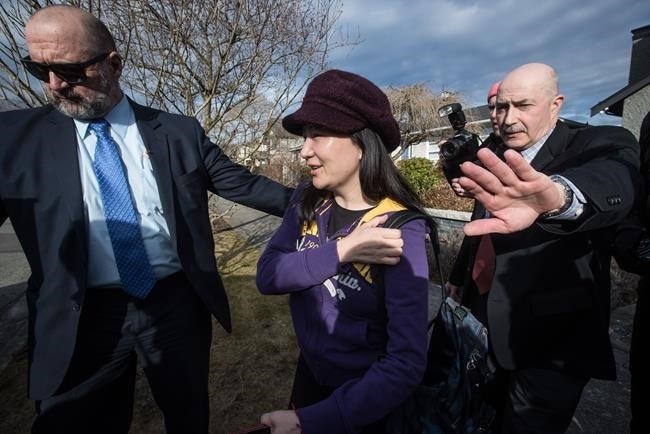
Huawei chief financial officer Meng Wanzhou, centre, who is out on bail and remains under partial house arrest after she was detained Dec. 1, 2018 at the behest of American authorities, is accompanied by a private security detail as she leaves her home to attend a court appearance in Vancouver, on Wednesday March 6, 2019.
Image Credit: THE CANADIAN PRESS/Darryl Dyck
March 06, 2019 - 11:30 AM
VANCOUVER - A defence lawyer says an extradition case involving Meng Wanzhou, the chief financial officer of Huawei Technologies, raises "serious concerns" about political motivations.
The executive was arrested in December at Vancouver's airport at the request of U.S. authorities and Canada announced last week it intends to proceed with the extradition case.
Meng's lawyer Richard Peck has told a British Columbia Supreme Court judge the case is "rare" and comments by United States President Donald Trump raise concerns.
Trump has said he'd intervene in the case if that helped secure a trade deal with Beijing.
Peck says the case is complex and will take time, and as a result the defence and Crown have agreed to put it over until May 8 to fix a date for an extradition hearing.
John Gibb-Carsley, the prosecutor representing the Attorney General of Canada, says over the coming weeks the Crown and defence will discuss which applications need to be brought forward.
Peck says abuse of process motions will likely be brought, and the defence has also filed access to information requests with the Canada Border Services Agency and the RCMP.
Last week, Meng filed a lawsuit against members of the CBSA, the federal government and the RCMP, accusing officers of violating her rights by detaining and questioning her for three hours before notifying her of her arrest.
The U.S. Department of Justice has laid out 13 criminal counts of conspiracy, fraud and obstruction against Huawei and Meng, who is the daughter of company founder Ren Zhengfei.
Both Meng and the company have denied any wrongdoing and the case has set off a diplomatic furor, with China's embassy calling it a "political persecution" against a Chinese high-tech enterprise.
One of Canada's largest grain processors has been blocked from exporting canola to China, and two Canadians detained by Beijing were accused of spying in a recent state media report.
News from © The Canadian Press, 2019